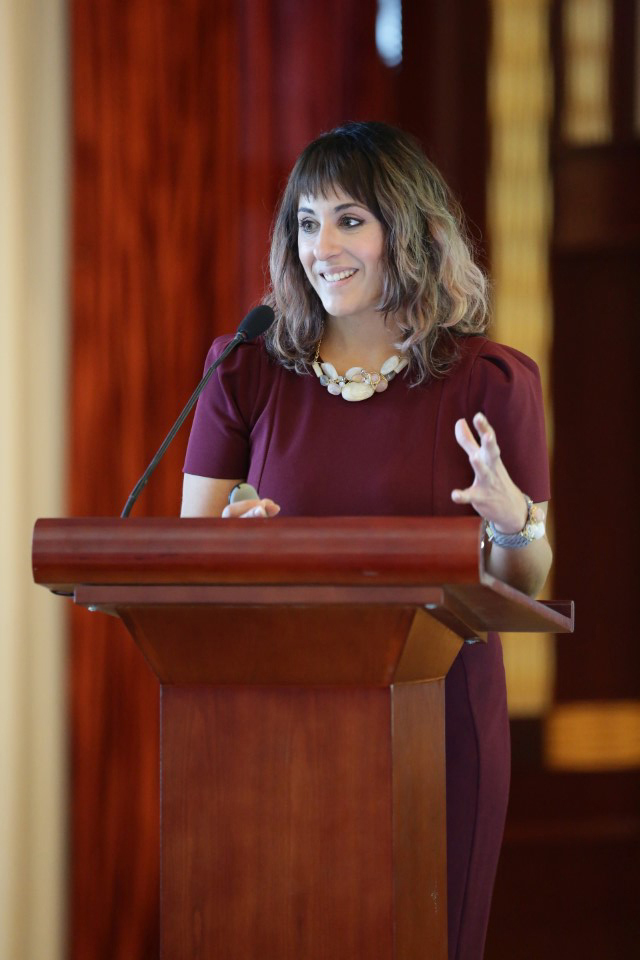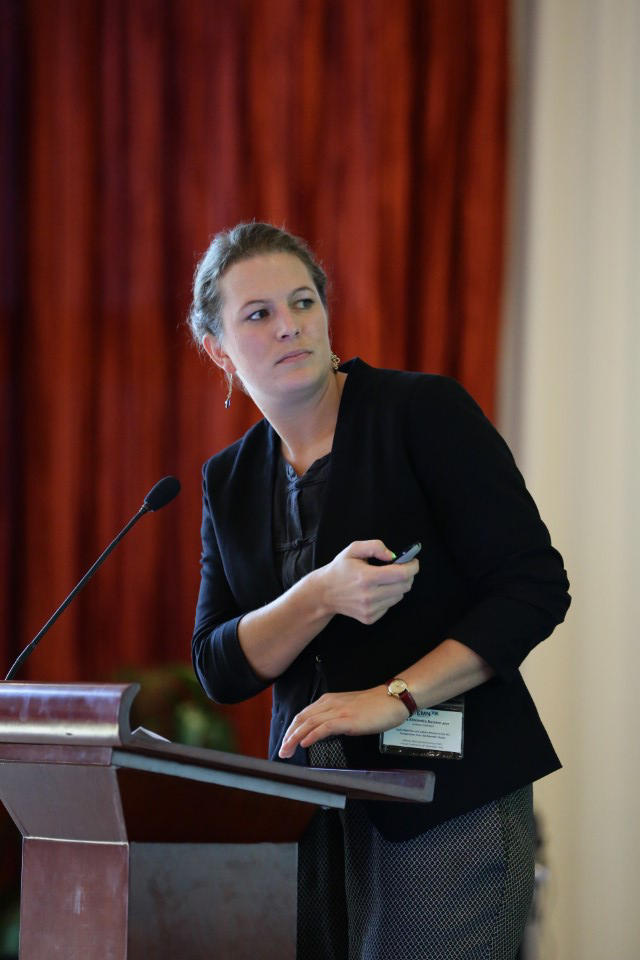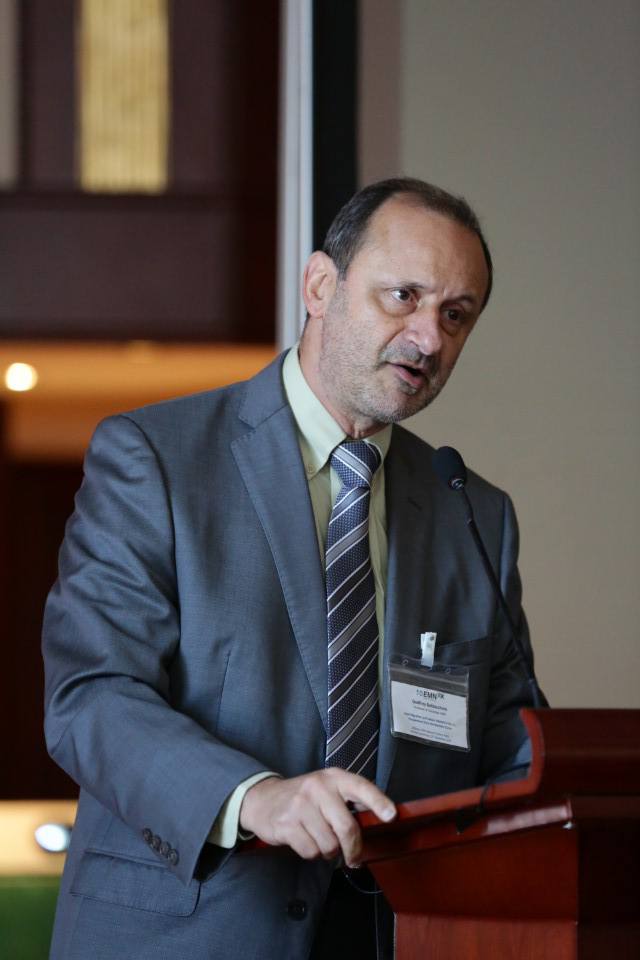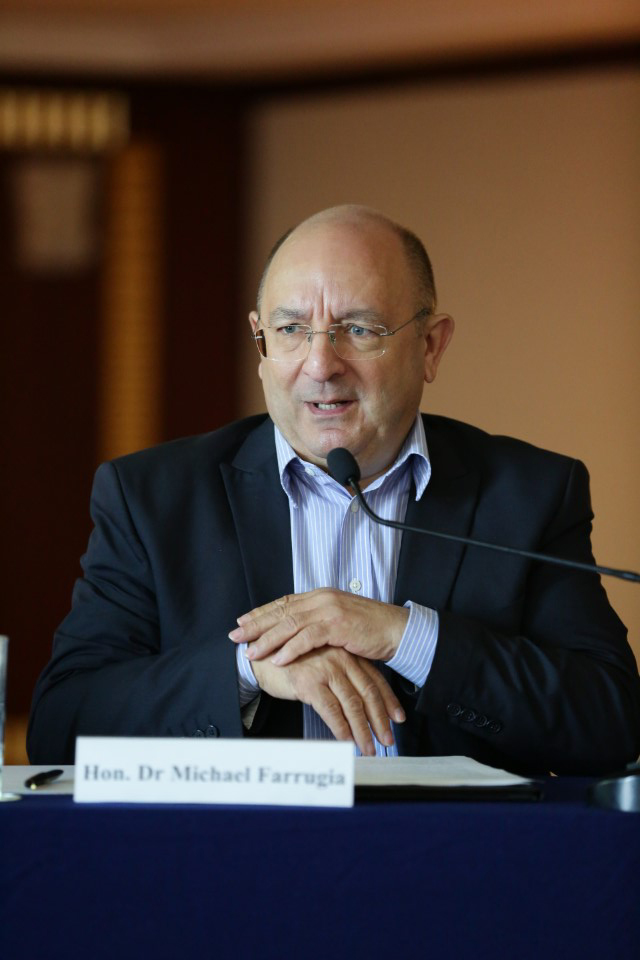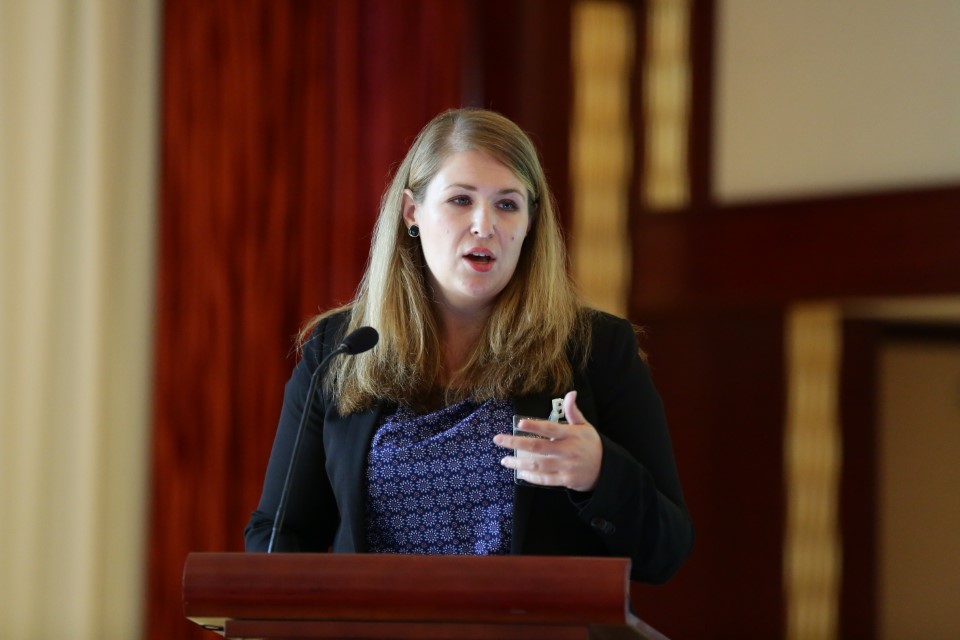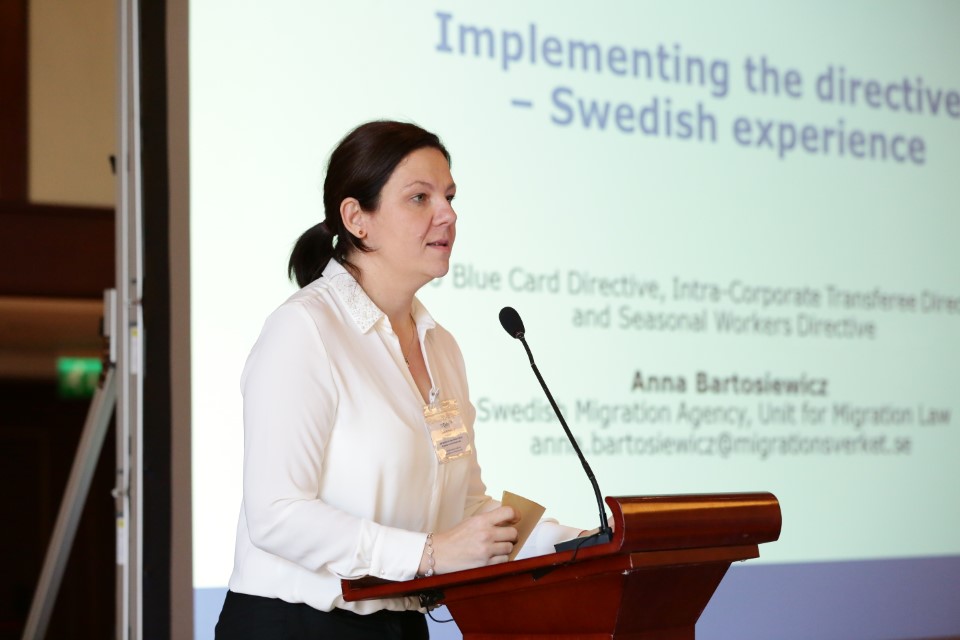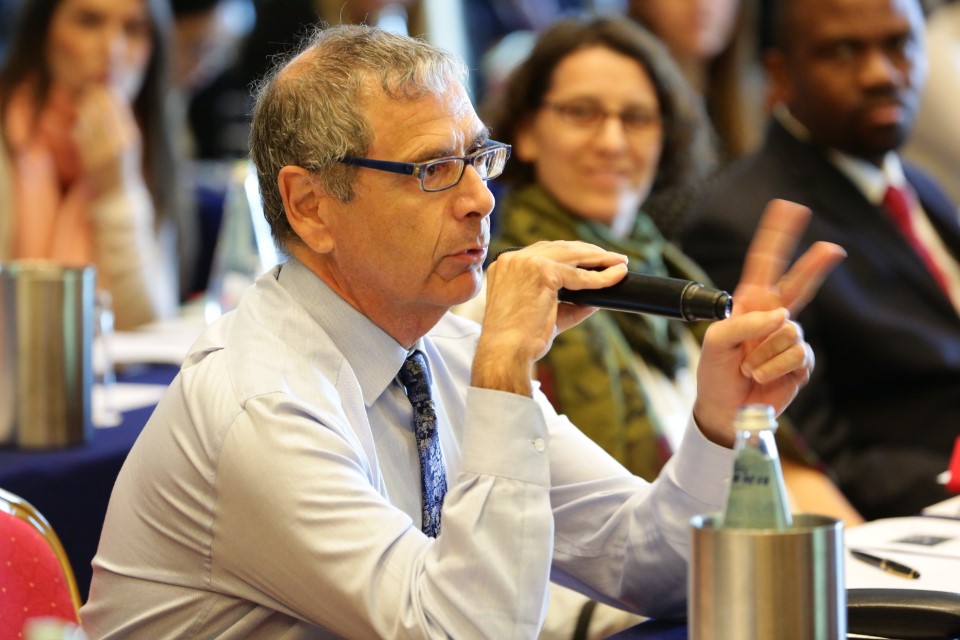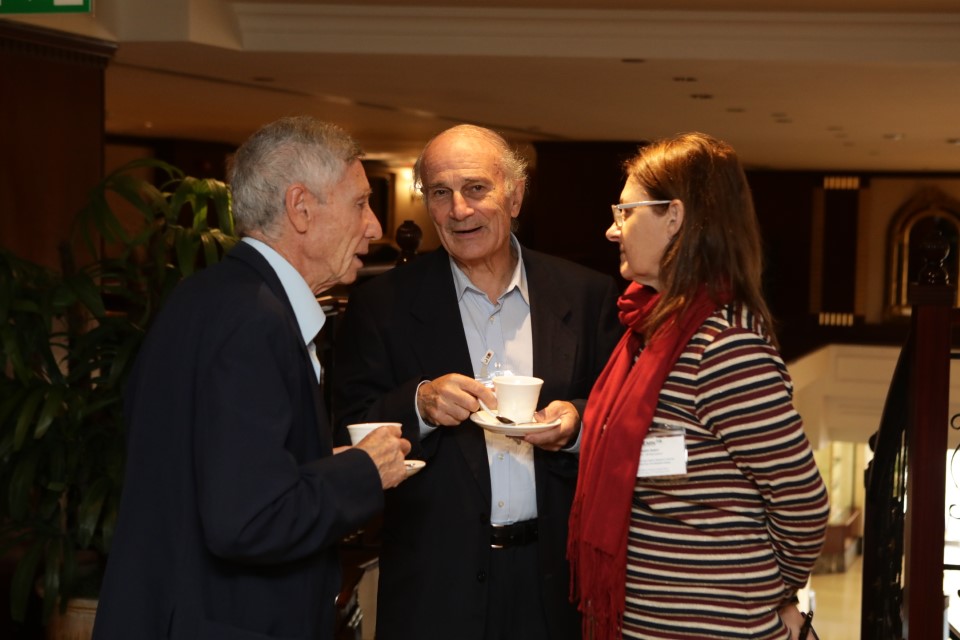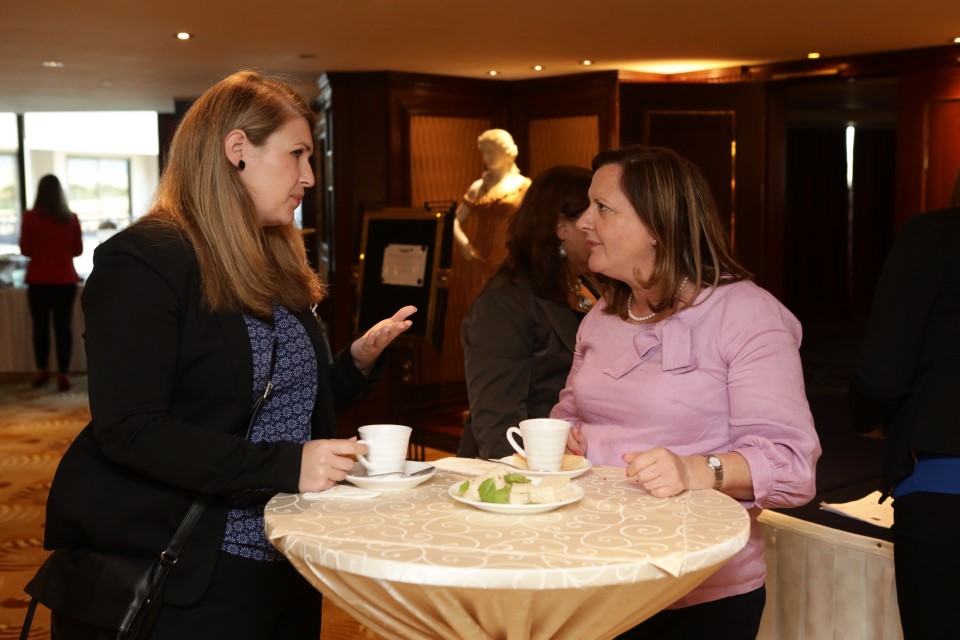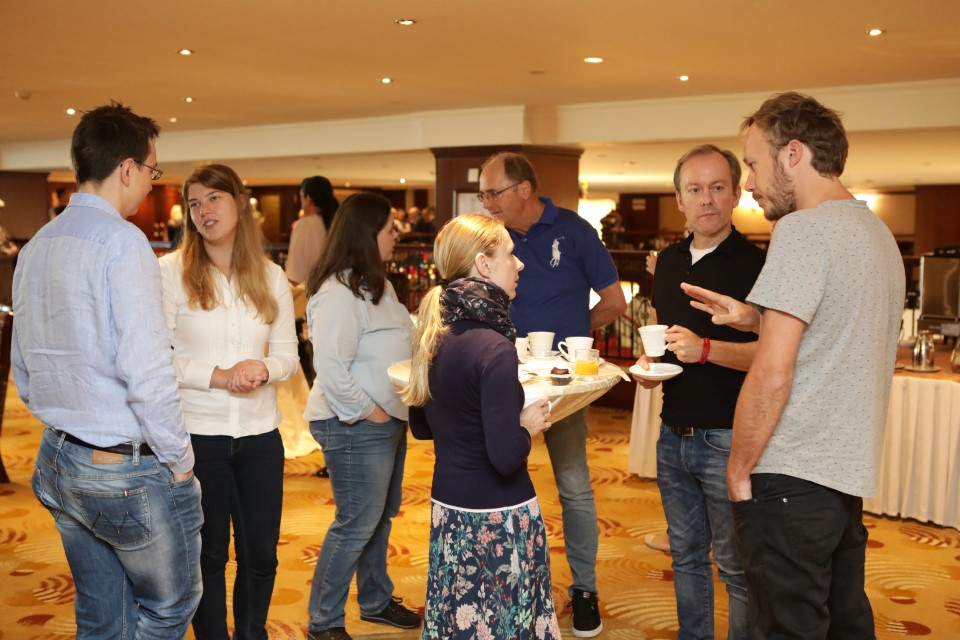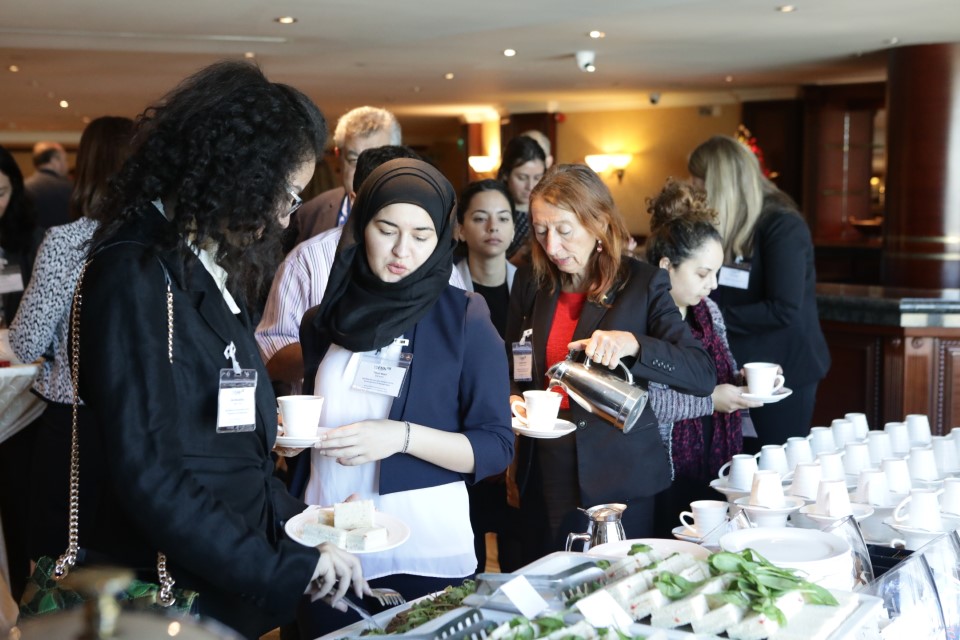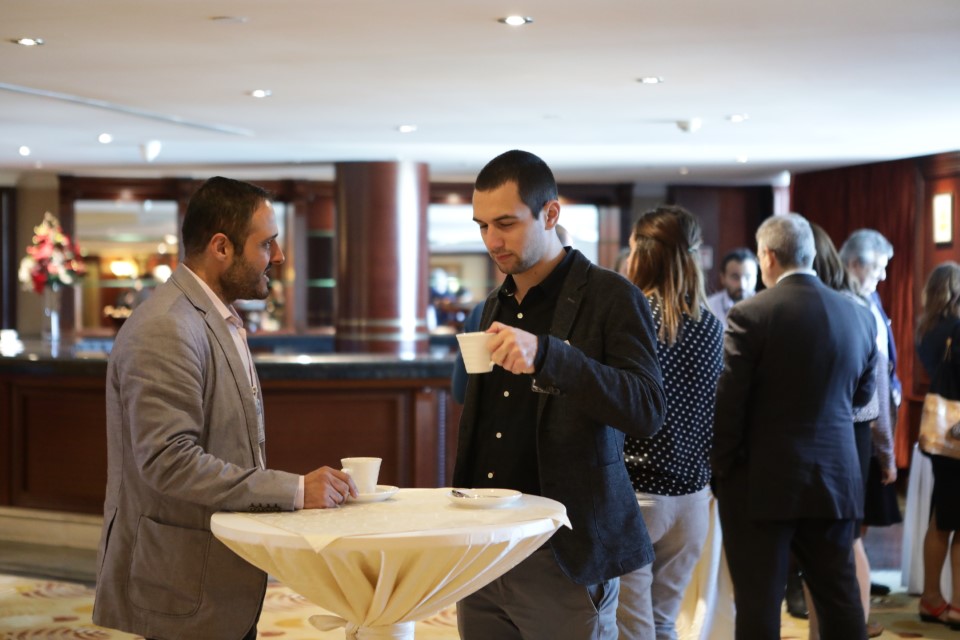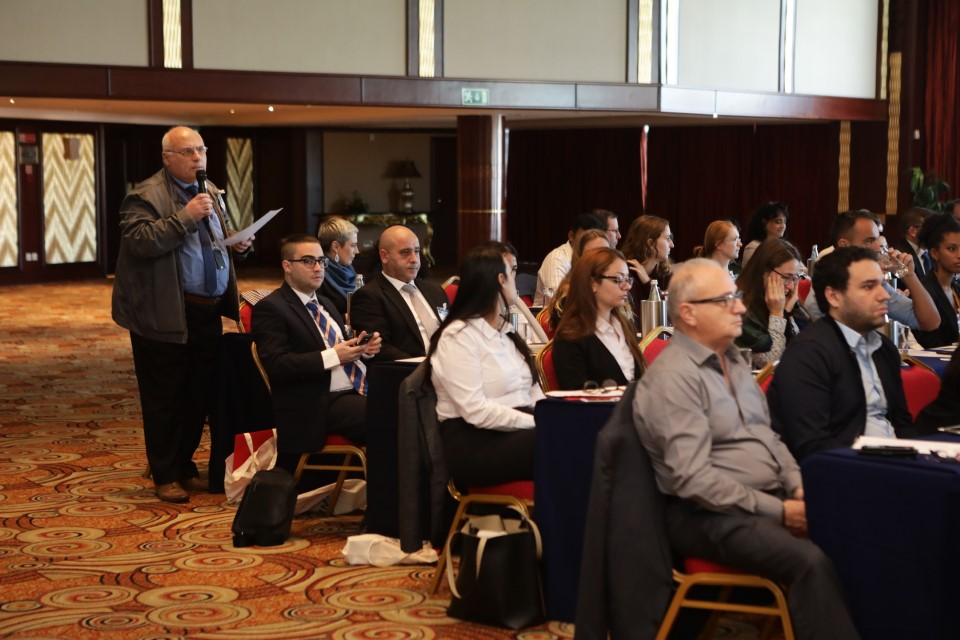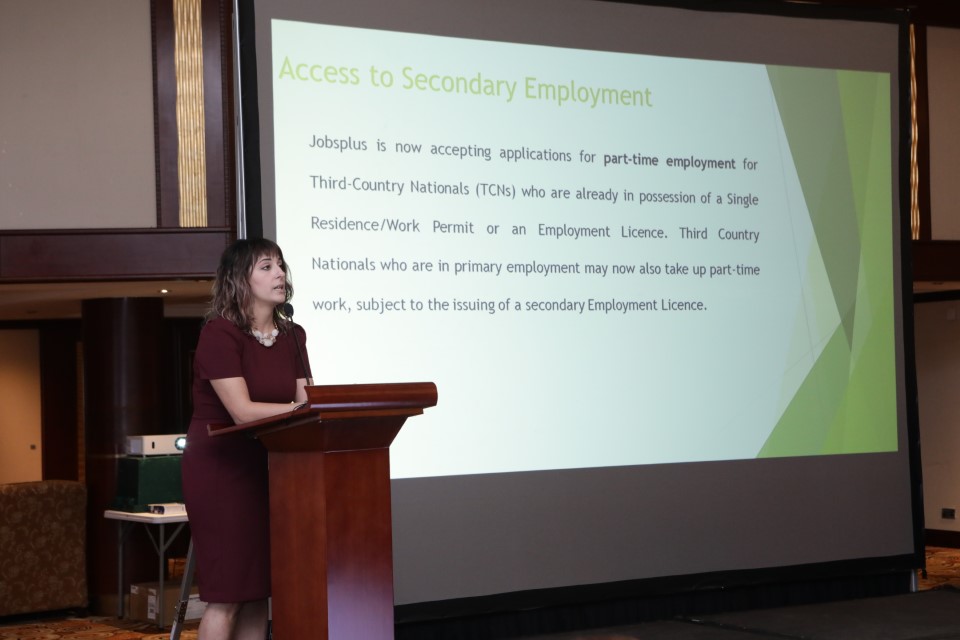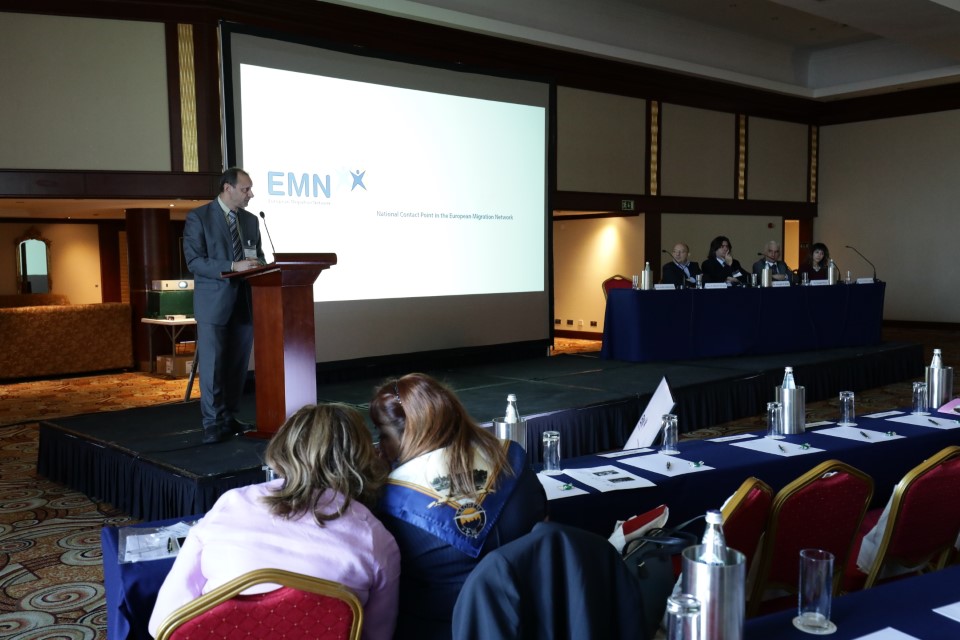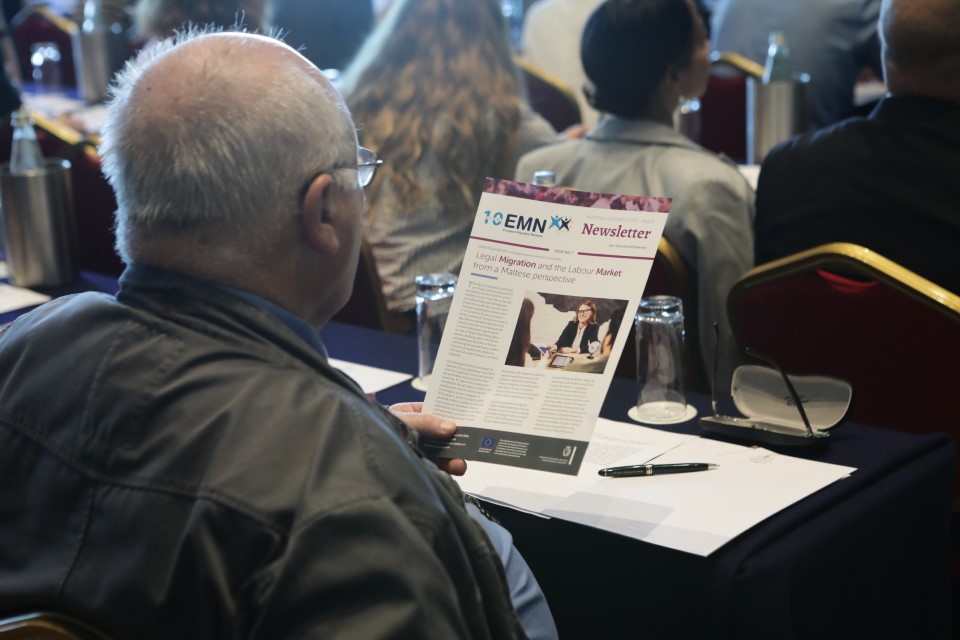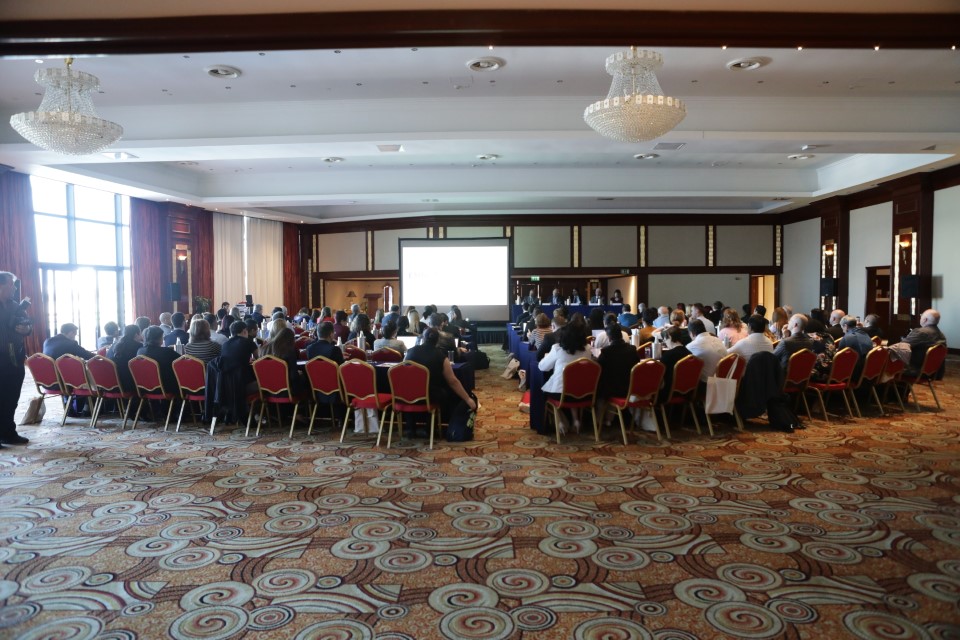EMN ANNUAL CONFERENCE – 13th November12018
The Conference started at 09:30am with an opening address delivered by Hon. Minister for Home Affairs and National Security, Dr. Michael Farrugia. His speech focused on sustainable legal migration and new policies, which are being set up to ensure sustainability.
The first speakers’ panel was made up of the Hon. Dr. Michael Farrugia, Prof. Baldacchino, Consultant at OPM, Mr. Joe Mizzi, Consultant at Identity Malta, Ms. Graziella Cauchi, Unit Manager Migration at Jobsplus and Mr. Joseph St.John from the Ministry for Home Affairs and National Security.
Mr. St. John chaired the conference, introducing the speakers of the first session together and giving an overview of theday’s agenda.
Prof. Godfrey Baldacchino’s address followed Dr. Michael Farrugia’s opening speech.
He opened his short address enquiring whether Malta has ever experienced such a wave of migration. Dr. Baldacchino opined that, in 1530 Malta saw a group of arrogant Europeans who came to Malta, settled here (Birgu and Senglea) and eventually made the island their own. For the Knights of St. John, the decision to come to Malta was not taken enthusiastically, since they had been dislodged from Rhodes. Besides Malta was not as lovely as Rhodes, but, they had no choice. They came here hoping for the best, with their main intention to return to Rhodes. It took them 35 years residing in Malta, to enforce their decision to remain on the island, and making it their home. This reminds us of how, many of the migrants working here, are not actually planning to remain in Malta, and one has to face the reality of this nomadic aspect of migration.
Another vital aspect of migration are statistics, however, no one can ascertain the exact statistics on the demographic aspect within context of migration, since migrants’ turnover in Malta is constant, which makes long-term planning very difficult. There are migrants planning to leave, and those planning to stay. According to Jobsplus, we have a healthy turnover of migrant labourers in Malta, which, as already stated, this makes long-term planning difficult, but, at the same time, it must be done, as it is important that replacements should be planned beforehand, to keep the economy going.
He explained that his presentation was based on:
Conservatism – on which he expanded, putting special focus on the great number of births by migrants, intergenerational family structures, gender roles may change, together with the use of social structures may change the demographic aspect of the island.
Ghettoisa
tion – was his second point, where he highlighted an increase in housing in certain areas, such as in St. Julian’s, and the pros and cons of such housing extremities, and where this might lead. Case-in-point, he brought up the salient issue of waste separation, where problems exist since not everybody is adhering to such new regulations, and migrants not interested in remaining in Malta are throwing everything in the same mixed-waste bag.
Public Consciousness – On the issue, Dr. Baldacchino stressed that, the State is seen as a focal point on migration, and here, he highlighted the aspect of reception services. But, he also emphasized that, integration works at a comprehensive and global level. Basically, integration was described as the building of a life on our islands at various levels.
The English language –Prof. Godfrey Baldacchino opined that, it has become the default language of the Maltese islands. Automatically we switch to English. Sadly, this has played a negative role for the Maltese language, especially in state schools, where Maltese language was the default language for years, and where students who could not communicate in English, had their problem solved by speaking in Maltese. However, now things have changed, due to diversity and multiculturalism and the Maltese language became a second language, paving the way to English becoming a Primary Language by default.
Prof. Baldacchino concluded by stating that, we need to be wary and careful when adopting policies involving civil society handling labour and migration issues.
Government Consultant on Migration to the Government of Malta – Mr. Joe Mizzi
Mr. Joe Mizzi delivered took the floor to deliver his presentation titled: Overview of the Legal Migration Legislative Framework in the European Union – a presentation, which was on 4 different and quite technical aspects of Migration which focused on:
· The Amsterdam Treaty
· Conclusions of Tampere Council
· The EU Commission Policy plan of Legal Migration 2005
· These plans in the Hague Programme and Stockholm Programme
He started by expanding on the importance of the Amsterdam Treaty vis-a-vis the Schengen acquis. Another important aspect are the Council Conclusions formulating a migration policy and asylum system. Mr. Mizzi informed participants that these integration initiatives were put in practice with 2 directives. However, he stated that, this would not be part of the presentation as these are quite debatable and hot issues.
The presentation started with the explanation of Article 79 of TFEU which states The Union shall develop a Common Immigration Policy aimed at ensuring, at all stages, the efficient management of migration flows, fair treatment of third-country nationals residing legally in Member States, and the prevention of, and enhanced measures to combat, illegal immigration and trafficking in human beings. He also discussed the Directives of retaining of Students and Researchers Directive. There was an initiative for employment but this was not very easy to implement due to different debates re not losing state sovereignty and manage their own migration. Nevertheless, the Amsterdam Treaty dealt with such issues and fragmenting such debates. The objective of the EU was that EU Member States should not compete for the talent that lay beyond the EU. However, unfortunately, we are facing such competitiveness with EU various Member States trying to lure highly educated migrants to their countries and the institutions are not challenging the due diligence. Under the circumstances, the Migration Policy in 2005 at The Hague Programme and the Stockholm Programme put such issues into perspective.
Mr. Mizzi continued to discuss Article 79 of the TFEU (Lisbon Treaty) within context of the conditions of entry and residence, and standards on the issue by Member States on long-term visas and residence permits, including those for the purpose of family reunification. As regards the definition of the rights of third-country nationals residing legally in a Member State, they include conditions governing freedom of movement and of residence in other Member States.
He continued discussing Article79 of the Lisbon Treaty emphasising paragraph 5 as a very important one with EU Member States retaining its rights to determine volumes of admission from TCNs Illegal immigration and unauthorised residence, including removal and repatriation of persons residing without authorisation – another aspect of this important articles is combatting trafficking in persons, in particular women and children.
The speaker reiterated that, The European Parliament and the Council, acting in accordance with the ordinary legislative procedure, may establish measures to provide incentives and support for the action of Member States with a view to promoting the integration of third-country nationals residing legally in their territories, excluding any harmonisation of the laws and regulations of the Member States. He stressed however, that this Article shall not affect the right of Member States to determine volumes of admission of third-country nationals coming from third countries to their territory in order to seek work, whether employed or self-employed.
His next focus in this presentation was on the Migration Directives 2009/50/EC and Directive 2014/36/EU. It is important to note that Migration Directive 2009/50/EC is what is better known as the Blue Card Directive, whereas Directive 2014/36/EU focuses on the conditions of entry and stay of third-country nationals for the purpose of employment as seasonal workers
Another directive, which was discussed, during this EMN Annual Conference, highlighted the conditions of entry and residence of third-country nationals for the purposes of research, studies, training, voluntary service, pupil exchange schemes or educational projects and au pairing.
Migration Directive 2011/91/EU was also discussed. Thisis known as the Single Permit Directive. Furthermore, the Directive features were discussed within context that they provide secure documentation in a harmonized approach while also providing a rigid procedural processing & right of appeal. These Directive also encompasses the volumes of admissions, Intra-EU Mobility, Complex Administrative Provisions and Statistics and Directives.
As regards plans, which brought to an end this presentation, Mr. Mizzi discussed issues focusing on revisiting the Directives, the Commission’s REFIT programme, an increase its economic wellbeing as to remain competitive as a block, the EU’s aims at being more attractive to investment and last but not least the attraction of talent. Furthermore, the speaker continued his conclusions by discussing the fact that, the EU wants innovative entrepreneurs, it endeavours to soften the impact of its demographic decline, while being sensitive by not creating a brain drain. However, this can only be done through the appropriate Global migration policies, involving third countries.
Graziella Cauchi -Jobsplus
Ms Cauchi delivered a presentation on Legal Migration and the Labour Market and she started by giving an overview of the presentation. In her presentation she discussed issues focusing on, Residence Permits Issued and whether Employment is really the main reason for Migration, which was followed by EUs focus on Labour Migration. She discussed the Local legal framework with a special emphasis on what are Employment Licences, who needs or does not need a Licence. Furthermore, she explained about Single Permits, the ELU’s main responsibility within context of Labour Market Testing and concluding with Demand for Workers and access to Secondary Employment.Ms. Cauchi continued this presentation by giving tangible data as to the number of Residence Permits, which were issued in Malta, from 2011 to 2017, followed by reasons presented for such applications, which varied from family, to education to employment and other reasons.
She then went on to explain about EU legislation, which was introduced to standardise admission and residence rules for Labour Migrants. Such laws incorporate, the Single Permit Directive for legally residing non-EU workers, the Students, Researchers Directive, which provides opportunity for Employment, the Blue Card Directive for highly qualified workers, the Seasonal Workers Directive to regularise seasonal work, concluding with Intra-Corporate Transferees as regards the posting/transfer of workers from Third Countries.
As regards Employment Licences, Ms. Cauchi gave an overview of the Maltese Immigration Act (Chapter 217), which explains in detail this issue. Furthermore she highlighted the categories of those who do not need an employment licence. These are Maltese nationals, foreign nationals with freedom of movement rights, posted workers from EU member states, and EU nationals and their family members. On the other hand, she gave an overview of the categories who do need employment licences and these encompass: Irregular Migrants or Asylum Applicants: Asylum Seekers or Failed Asylum Seekers, persons granted national or international protection (THP, SP, REF). As regards Third Country Nationals who are not eligible for the Single Permit Process, these include Self-Employed TCNs, Temporary TCN Workers (Less than 6 months), TCN Student Workers, Intra-Corporate Transferees and Long Term Residents.
When discussing Single Permit Applications, she emphasised that, as from the 21 July 2014, TCNs eligible for a Single Permit, need to apply for a combined Residence/Work Permit. As regards Blue Card applicants, they also need to go through a single permit procedure, whereby, applications are to be submitted at Identity Malta, while highlighting Jobsplus’ responsibility in this process, which is to approve or reject the work permit, by assessing these applications, from a Labour Market point of view. She went on to explain about Labour Market Testing, stating that it is divided on 3 different aspects, varying from the situation of the Labour Market, the suitability of the individual and checks carried out on the prospective employer. The speaker then went on to highlight the categories of exemptions to the Labour Market Testing and these categories encompass, Beneficiaries of Protection and Long Term Residents. Exemptions also apply to, Health Related Professionals, Technical & Building Professionals, IT, Finance, Gaming and Education Professionals.
As regards the issue of access to secondary employment, she informed participants present that, Jobsplus is now accepting applications for part-time employment for Third-Country Nationals (TCNs), who are already in possession of a Single Residence/Work Permit, or an Employment Licence. Third Country Nationals, who are in primary employment, may now also take up part-time work, subject to the issuing of a secondary Employment Licence.
Then she moved on to give an overview of unemployment figures as at 2017 and 2018, while discussing this within an EU perspective, comparing unemployment in Malta to that of the various EU Member States. She then explained the work of the Employment Licences Unit, andshe confirmed that in 2017 it processed 21,196 applications varying from, those for Single Permit Applications, for a Blue Card, applications from asylum seekers and beneficiaries of International Protection, non-EUs eligible for Single Permit Process and Croatian families and their family members. Furthermore she informed participants that, as regards labour migration, the Employment Licences Unit during the year of 2018, received a total of 27,636 applications which encompassed Single Permit Applications, Blue Card applications, Seasonal / Temporary Workers (less than 6 months), Student Workers, ICTs, Service Providers, Other TCNs (Long Term, Secondary, Self-Employed etc.) and Asylum Applicants / Beneficiaries of Protection.
She went on to highlight the top 15 occupations for which the Employment Licences Unit received applications and these occupations include low-skilled workers, but also highly skilled ones like Managing Directors or CEOs and Programmers and Software developers.Ms. Cauchi concluded this presentation by giving an overview of the 10 top nationalities employed in Malta, from 2002 to 2017. These nationalities were Serbia and Montenegro, Philippines, Libya, India, Russian Federation, Turkey, Ukraine, Somalia, Pakistan and the Former Yugoslav Republic of Macedonia and she opined that they envisage that these figures are apt to increase in future.
Q&A time
This question was directed at Prof. Dr. Godfrey Baldacchino, and this first question focused on whether we intend to absorb the huge numbers of migrants? Are we just thinking of those coming over together with communication difficulties? This also includes the issue of various employments leading to the equally various problematics linked to language difficulties. When referring to Maltese as a second language, this is turning the subject upside down. We should teach Maltese as a second language for those coming to join us, while we are not thinking of those absorbing the number of migrants.
The answer was – For a small country this is not just perception but a real case.
Another question was directed at Mr. Joe Mizzi. It focused on Fair treatment is meant for workers or as citizens.
Joe Mizzi answered that equal rights should be the norm – trade unions, labour laws, social security services etc. He stressed that if Maltese nationals get free hospital treatment it should be the same to TCNs. As regards education however, he opined that there is derogation. In his opinion, as citizens, the principles are all there in the directives, and we see their guarantee of their rights. The more they get integrated they are more entitled to get their rights – after 5 years in Malta they can get Permanent Residence in Malta. As regards integration, the learning of the Maltese language, and the granting of long-term status, it is important to note that, the directive includes language tests, and in 2014 Government amended the need of passing the language tests. Now it became a prerogative that one has to pass the Maltese language test to be able to pass and be selected for an employment
Second questions for Ms. Graziella Cauchi – in case of TCNs applying for a 2nd employment can it be issued on its own as a work permit?
She answered that for those in possession for a first licence. If first employment is terminated they cannot continue working on a 2nd employment.
Question was also directed at Ms. Graziella Cauchi – for how long is a working permit valid? The statistics given include repeat applicants? If we have a number of repeat applications in 2017, can you explain the difference
?
Ms. Cauchi answered that, Employment licences are normally issued for 1 year, but there are those, which are issued for less. In addition, she confirmed that these are not just new applications but renewal applications. Re 16,000 figures show those who are actively in employment, who are registered as employed. A small number of application will not be taken that application any further. So numbers do not actually show the real number of migrants in the Labour Market.
Question re contract workers – The salary which was stated is paid into their accounts in their country of origin, does this mean that they bypass any type of taxes etc?
If they are exempt from the need of employment licence there is legislation – these TCNs working in a company another EU MS – when the transfer takes place, this is done thru the company in the other MS. They can be posted for a 1-year contract.
Set of Questions – Graziella Cauchi
Re Health professionals-IT-gaming professionals? How are such decisions made, how do you identify these categories? Are those identified as there is some kind of shortage?
These individuals are not exempt from employment licence. However, colleagues, from ID Malta, identify these categories. Re shortages, Jobsplus flag and deal with them. Re partnership with 3rd country – there is sourcing from 3rd countries to counter such shortages.
Government Consultant on Migration Mr. Joe Mizzi highlighted a point – re how labour market tests are different from community preference. Then he discussed an issue with the chairperson Mr. Joe St.John re lack of functioning of EU Directives. He went on to say that the ‘Highly Qualified’ issue is highly under negotiations, and it is a very debatable issue and we don’t know how it’s going to develop. They want to be more liberal in the way that applications are directed. There were 2 to 3 cases concerning student directives, where Germany had refused a student as they stated that it was not proved that the student was going to follow the said course. Re the single permit directive – the rights will remain as they are, but the procedure will be more refined. Mr. Mizzi concluded his short intervention by stating that the EU Commission wants to attract more entrepreneurs.
2nd SESSION
Panel – Dr Dustin Camilleri (Identity Malta Legal Officer)
He gave an overview of his CV- in relation to his employment with the AG as regards the issue of Human Trafficking.
He stated that at ID Malta, checking of documents now is the norm. Not checking of documentation, will be counterproductive for those wanting to exploit, both the system and the migrants themselves.
Dr. Camilleri spoke about the making use of Labour Market to integrate the Labour Migrant. He informed participants that, IdentityMalta is the link to all aspects of the application – assessing the application prior to the migrant arriving to Malta. Good relations with stakeholders and mainly employers are vital. That way they know the migrant first hand. If you do not have an administrative style experience, the situation for the migrant will become a negative one. Presently, the bulk of applications being submitted come from low-skilled workers. Under the circumstances, more care needs to be given to the application thus ensuring no one is abused. This has become a daily procedure. The speaker opined that good relations with agents and employers alike is important not to end up in situations of litigation. He stated that, this is a vibrant subject with an ongoing need of training even more since this is a human issue. Ongoing training is vital (such as training focuses on amongst other on fraudulent emails since everything is presently carried out email). Temporary integration is the core of his presentation. He emphasised on the fact that for a person to integrate in a labour market can be maximised. A legal migrant is to use the labour market if he achieves maximum working ability that he is here, but that cannot happen if key indicators for integration are not present.
Dr. Camilleri explained how at the Expatriates Department, the worst problem is miscommunication due to language barriers, thus this is being dealt with, by updating checklists and identifying problematic issues. There is a personal approach to each applicant at ID Malta, aiding the client not just during the time of the filling up of the application, but also during the process of the application itself. More applications are being received annually mainly by short skilled workers, so at Identity Malta they are trying to shorten the time of the process. Dr. Camilleri concluded his intervention by stating that there is a process of simplification at Identity Malta,. Every applicant at ID Malta is dealt with in a very humane manner, as this means that you have a person’s future in your hands.
Q&A
What entitlement does a person who has this blue paper receipt have?
This means application is being assessed and that blue paper shows this. As Identity Malta they don’t have form of identification such as banks. Identity Malta does not have authority to tell banks to accept such blue paper. But when you have residence card this is accepted by other entities. If a person who has been in Malta for 5 years gets a blue paper which is not being recognized by companies and same issue prevails if he needs to apply for a driving licence. They are told they need ID Card so the application is submitted to an appeals board. Furthermore, Dr. Camilleri stated that that this blue paper is an interim receipt and there is no authority to change that policy. Once they have residency they entities should accept everyone.
Question – Re trafficking of human beings- are procedures at Identity Malta developed locally or developed EU wise?
Most cases they start with the person involved going to Identity Malta but itsremit is not investigation. If there are indications of human trafficking, the agencypasses on case to police for investigation. It is not easy to establish human trafficking. Law is specific in Malta. Once a person discloses information, they pass on that information and measures are taken accordingly
Question: Re discrimination and more sustainable policy – she mentioned that Africans were mentioned immediately. However, in reality there is the need of visa. TCNs coming from Africa do not know that they have to apply for a visa after 3 months. So, the delegate was wondering whether we are not seeing the wood in the trees, and you are overlooking the issue of contract workers vis-a-vis multinationals.
Dr. Camilleri could not talk re specific cases for obvious reasons. The country of origin doesn’t matter, it matters for application purposes. Re discrimination and process application, there is the law and it is applied it to all. Furthermore, this has to be dealt with in an EU manner – in a holistic manner.
Question: When you speak of low-skilled applicants do you get any info or by impressions? Do you get a sense of getting in low skilled people? Do you speak with employers?
Dr. Camilleri stated that, time is relative to what is being implied, however it is not an excuse not to follow the law, but yes, there is room for improvement. Information to Third Country Nationals is given to the applicant. They do talk with those who might lack documentation. However, most of the time ID Malta staff talk to the applicants, and they get to know that the information they obtained came from their employers.
Mr. Joe Mizzi intervened as Advisor of Identity Malta – continued on what Dr. Camilleri stated. If you look at Single Permit Directive, EU Member States wanted that, Single Permit workers can apply if they come from an EU Member State. That is a personal issue. The Agency decided to extend the policy for people with visa so can also apply. Nevertheless, authorisation lapses until the expiration of the visa. Most applicants are from the Western Balkans. Given that, it is physically impossible to monitor those coming from non-Schengen countries, the inflow has to be managed effectively and ID Malta can tackle the issue with Jobsplus, in view of the huge labour demand.
AFTERNOON SESSION
LEGAL MIGRATION IN AUSTRIA: RROM HISTORICAL DEVELOPMENT TO CURRENT TRENDS
BY -MARIA-ALEXANDRA BASSERMAN, AUSTRIAN
EMN NCP
Ms Basserman a member of the AU EMN NCP, started her presentation by giving an overview of the Austrian net migration from 1961 to 2017 with statistics showing Foreign Nationals – Austrian Nationals and a Net Migration Graph. Then she moved on to the Development of Labour Migration in Austria – divided into background conditions, general legal trends and selected measures starting from 1960 – 1968; 1969 – 1984, describing emigration of Austrian workers – post WW2 economic boom. She stated that Austria saw an increase in migration starting from 1980 to 1992. Basically, post fall of Iron Curtain and civil war in former Yugoslavia, brought increased refugee inflows which brought stricter immigration policies and laws thus introducing quota system for work permits in 1990. She also discussed the Evolution of the Austrian Aliens Law (1993-today) together with the EU Blue Card Directive and Single Permit Directive, followed by attempts to manage migration more efficiently. The speaker then focused on the Current legal migration trends – highlighting Immigration to Austria by Group of Citizenship (2017) and by First residence permits granted in Austria by reason (2017), with Education & Family reasons among others as primary reasons. Austria aims to facilitate the admission of qualified workers, and to counteract wage and social dumping, while facilitating the admission of start-up founders and to promote innovation. She concluded her presentation by focusing on Labour market integration, citing it as a key component in the integration process in Austria. This is re-enforced by the Integration Act, which attributes a major role to measures, which are aimed at facilitating rapid labour market entry. One example of an integration measure is the integration agreement, which aims to encourage migrants to improve their language skills and become better oriented in society. In fact, migrants commit themselves to learning German and a knowledge of the democratic system
Implementing the Directives – Swedish experience – EU Blue Card Directive, Intra-Corporate Transferee Directive and Seasonal Workers Directive
By: Ms. Anna Bartosiewicz – Swedish Migration Agency, Unit for Migration Law
Ms. Bartosiewicz started her presentation by giving a detailed overview of what she would be discussing, which encompassed, Work permit in Sweden, Legal framework for work permit in Sweden, Employers right to decide – qualification and demand, Employment – requirements, Collective Agreement, Trade Unions, No quantitative restrictions. She then continued by highlighting Sweden as a destination for foreign workforce giving detailed statistics on applications submitted and permits issued. She opined that there are criteria for those who have been residing in Sweden for more than 4 years. She then continued with the discussion focusing on the EU BLUE CARD Directive, which she stated that it was implemented in August 2013. It is a system parallel with the national provisions on labour migration. The permit can be granted according to national provisions instead entitles a holder to a permanent residence permit. The conclusive factor of the Blue Card Directive was demonstrated with statistics gathered from 2014 to 2018. Further discussion ensued focusing on the Intra-Corporate Transferee Directive, which was Implemented in December 2017. Remuneration & Other conditions were discussed together with the need of Sufficient resources during stay in Sweden. However the speaker stated that there are no quantitative restrictions. This directive also entitles a holder to a permanent residence permit in Sweden. Ms. Bartosiewicz stated that 205 applications for Intra-corporate transferee permit. She then went on to discuss the Seasonal Workers Directive, which was Implemented in June 2018 and which, in Sweden Seasonal workers is a large group. She stressed on national provisions and experience factors, together with the requirement that an employer is established in Sweden, with permits being available just for family members. In her concluding remarks, the speaker said that it is too early to say on whether this directive is of a success.
SLOVENIA EMN NCP – ANJA DANGUBIC (Ministry of Labour, Family, Social Affairs & Equal Opportunities – Republic of Slovenia)
LABOUR MIGRATION & EMP0LOYMENT OF FOREIGNERS IN SLOVENIA – THE GOOD AND THE BAD
This was the final presentation of the EMN Annual Conference. Ms. Dangubic started her presentation by discussing Migration Factors in Slovenia highlighting 2 very important agreements being: The Agreement on the Employment of Citizens of Bosnia and Herzegovina in the Republic of Slovenia (in force from 2013), and the Agreement on the Employment of Citizens of Republic of Serbia in the Republic of Slovenia (signed in 2018).
She emphasized the importance of the fact that Slovenia relies heavily on the Balkan States for its workforce, especially, due to linguistic, cultural and historical proximity, with statistics showing that 92% are Balkan States nationals. She then gave an overview of the Employment trends in Slovenia, stating that A research, carried out by Employment Service, among employers with at least 10 employees. Most sought after vocations by employers, according to forecast for 2018/II, are workers for simple tasks in manufacturing industry, heavy truck drivers, salesmen, welders and masonry, which are also among hardest to find among nationals. Then she went on to discuss Labour Migration, Legislation and the Relevant Institutions, citing the Ministry of the Interior and the Ministry of Labour, Family, Social Affairs and Equal Opportunities as the main actors in the administrative process.
The speaker then discussed the purpose of residence and economic activity and single permit, highlighting employment or work, EU Blue Card, Self Employment, Seasonal Work and Postings as main reasons for purpose of residency. She then gave a detailed explanation about the single permit procedure in Slovenia. She enhanced this by describing the conditions for issuing a single-permit for economic activity. She cited the following reasons for employment, Labour Market Test, the employer is appropriately registered, the employer is not in a bankruptcy procedure, the employer is actively pursuing its business operations and has no outstanding tax liabilities (incl. wages and social contributions). This followed by a discussion on Basic conditions for the consent of the Employment Service to be given, which encompass the fact that the Alien concerned holds at least a higher education degree and An employment contract of at least one year is signed, ensuring a salary of at least 1.5 times the average gross salary. The speaker concluded her presentation discussing the advantages vs the challenges that the Republic of Slovenia has been encountering in the sphere of labour migration and employment of foreigners.
This presentation concluded the EMN MT NCP Annual Conference, with the Conference being described as a very fruitful one.
